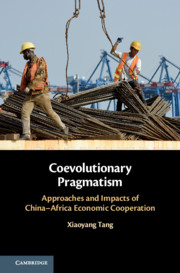Book contents
- Coevolutionary Pragmatism
- Coevolutionary Pragmatism
- Copyright page
- Dedication
- Contents
- Figures
- Tables
- Preface
- Foreword
- Abbreviations
- 1 A “Model” with No Model
- 2 Trade
- 3 Infrastructure
- 4 Agriculture
- 5 Manufacturing
- 6 Special Economic Zones
- 7 Employment and Training
- 8 Social and Environmental Responsibility
- Conclusion
- Index
2 - Trade
Published online by Cambridge University Press: 24 December 2020
- Coevolutionary Pragmatism
- Coevolutionary Pragmatism
- Copyright page
- Dedication
- Contents
- Figures
- Tables
- Preface
- Foreword
- Abbreviations
- 1 A “Model” with No Model
- 2 Trade
- 3 Infrastructure
- 4 Agriculture
- 5 Manufacturing
- 6 Special Economic Zones
- 7 Employment and Training
- 8 Social and Environmental Responsibility
- Conclusion
- Index
Summary
Trade is the most direct form to promote market exchange and international division of labor. The volume of China-Africa trade has been growing phenomenally through the efforts of numerous pioneering merchants on both sides. While African consumers get more choices of reasonably priced goods, the weakness of regulation and inspection threatens healthy development of market. At the early stage of a market economy, authorities usually do not have sufficient capacity, knowledge, or experience of managing the complex markets; therefore illegal traders take advantage of the loopholes to flood African markets with substandard inferior products. To nurture the burgeoning market, Chinese and African authorities do not demand wholesale elevation of quality requirements, but instead take incremental steps to enhance communication and inspection measures. Short-term individual demands of consumers and sellers find balance with long-term public interests of market order gradually through evolving business practices. Another issue is the imbalance of trade structure. China exports mainly industrial products and imports natural resources from Africa. Although the trade imbalance is a result of market liberalization and comparative advantage, it’s unsustainable economically and generates negative sociopolitical consequences. Comprehensive industrialization of Africa is needed to change the situation.
Keywords
- Type
- Chapter
- Information
- Coevolutionary PragmatismApproaches and Impacts of China-Africa Economic Cooperation, pp. 45 - 73Publisher: Cambridge University PressPrint publication year: 2021



